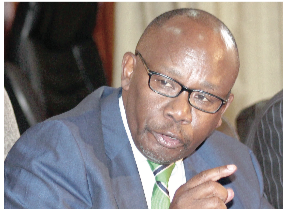How clerics shot down former AG’s plan to regulate churches

Details have emerged of how President Uhuru Kenyatta administration had in 2015 put together stringent rules on the registration and regulation of religious organisations.
The Societies (Religious Societies) Rules, 2015, conceived during the tenure of Prof Githu Muigai as Attorney General, were meant to control the registration of religious organisations but were rejected by the religious leaders on account they were punitive.
According to the rules, which were last week submitted to the Senate ad hoc committee investigating cult deaths in Shakahola, the application for registration of a religious entity had to be accompanied by personal information about its leaders.
Tax clearance
The leaders had to submit a copy of the National Identity card, Kenya Revenue Authority (KRA) Personal Identification Pin (PIN), a passport photograph, a certified copy of the theological certificate from a duly registered and accredited theological institution, and a tax clearance or exemption certificate.
“We believe had these regulations been in place, what is happening in Shakahola would have been avoided,” Maria Goretti, the Registrar General, told the committee which is chaired by Tana River Senator Danson Mungatana.
But religious leaders rejected the proposed regulations even though an elaborate consultative process had been carried out.
The regulations were conceived at a time radicalisation of youths and their recruitment for violent and illegal activities had become an issue of national concern.
Al-Shabaab terror attacks were also on the rise. The attacks include the Westgate Mall attack in 2013 and the April 2, 2015 attack on Garissa University College where the militants killed 148 students and security personnel.
In the wake of the rise of radicalisation, Muigai had in 2014 slapped a moratorium on registration of religious organisations.
The regulations were to help streamline churches and mosques.
This was aimed at weeding out those who had exploited the law to commercialise places of worship and control mosques from being used as recruitment centres for terrorists.
The proposals were shelved after Muigai came under attack from religious leaders.
Under the current law, an association is registered once it has 10 people. But in Prof Muigai’s proposed regulations, a religious society would have required a membership of not less than 2,000 for it to be registered.
Organisations seeking registration would have been required to submit a list of all its leaders, including a copy of their personal identification numbers, national IDs and passport photograph.
Raila suit
President William Ruto has attracted criticism from some religious leaders and politicians following the establishment of a commission of inquiry on the Shakahola deaths and a taskforce of religious organisations.
Some critics opposed to the move argued that the decision by the President undermined independent constitutional commissions and offices in executing their mandate.
Opposition leader Raila Odinga has gone to court to challenge the formation of the commission of inquiry, claiming that it was unconstitutional.
He also alleges that the Kenya Kwanza administration cannot be relied upon to investigate the Shakahola deaths some powerful individuals close to the President are linked to the cult.
In response to the Shakahola tragedy, the Senate, through a motion by Majority Whip Boni Khalwale (Kakamega), approved a motion setting up the ad hoc committee to probe the deaths.
Some members of the Senate committee have claimed that the President’s decision to form the commission and task force was meant to undermine the work of Senators.












